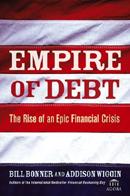Another rate hike by the Fed, its 13th since it began in 2004.
Everyone said it would raise rates another time. It did. The Dow rose 55 points. Why not? Fed officials said the economy is "solid."
Of all the many adjectives that could apply to the U.S. economy, "solid" probably describes it least well. It may be "dynamic" – we don’t know. It may be "flexible," "spectacular," or many other things. But solid it is not.
We have mentioned the reasons many times. We are getting as bored reciting them as you must be hearing about them. So, we move on.
We leave only the remark that an economy in which people earn less than they did the year before, spend more than ever, and save less than nothing is not solid. It is hollow. Or it is empty. Or is it soft…squishy…molasses-like.
If it is not solid, it is a liquid or a gas. In our guess, it is nothing more than a bubble floating in a world of pins.
"Yes, but American businesses are becoming more profitable than ever," say the Feds. "That’s why so many people want a piece of this economy…that’s why foreigners are willing to lend…and that’s why we don’t have to worry. The economy is in great shape."
At least in theory, American businesses are able to trim payroll costs – either by directly outsourcing to lower-cost areas, or benefiting indirectly from the globalization of the labor markets that has kept real U.S. hourly wages from rising for the last 30 years.
The problem is obvious. Unless U.S. businesses are able to sell overseas as well as buy overseas, their main market is still right here at home. How then can they sell more and more product to people who don’t earn more money? There is only one way: by expanding credit. The buyers have to go further and further into debt.
"Well, why can’t they just keep going into debt? After all, the value of their assets (presumably, value of the nation’s ever-more profitable businesses) is rising."
But rising asset values are a feint and a fraud. You can’t really sell off your house one room at a time in order to improve your lifestyle. Nor are companies that sell more products to more people who can’t afford them really worth more. At the end of the day, the apparent strength and solidity of the economy just evaporates.
Gold fell yesterday. It is in an upward trend, we guess, because it knows the economy, the dollar, and U.S. stocks and bonds are not nearly as "solid" as the feds say they are. Gold is really solid. People who want a little solidity in their lives hold gold. The more they sense that other things are not solid, the more they want to feel something solid in their pockets.
"You know, there is just something nice about gold coins," said my old friend Doug Casey, the other day. "I just like the feel of them. They just feel solid."
Doug told us that our technique of buying gold on dips will be hard to implement: "This market is taking off. It’s not going up and down like a yo-yo…giving you a chance to buy every time it goes down. Instead, it’s a like a train leaving the station. You’re either on board or you’re not."
The gold bull market has entered its second phase. In the last five years, the price doubled, but there were many chances to get into gold at good prices. We recommended it below $300. Each time it would go up, people would say, "well, that’s the end of that." And each time, gold would go down. Buyers were discouraged. Often, they waited to see if it would go down more before buying. Then, the price would take another step up.
 Now, the market is taking bigger steps. The cautious buyer is finding it harder than ever to get into gold, because it doesn’t drop back far enough to hit his or her targets.
Now, the market is taking bigger steps. The cautious buyer is finding it harder than ever to get into gold, because it doesn’t drop back far enough to hit his or her targets.
"It’s time to change the strategy," said Doug. "Look, the price could easily go to $1,000 an ounce next year. It won’t matter if you bought at $500 or $550. You’ll be way ahead of the game. I know I’m on board this train."
We’re going to ride it to glory, dear reader.
Bill Bonner [send him mail] is the author, with Addison Wiggin, of Financial Reckoning Day: Surviving the Soft Depression of The 21st Century and Empire of Debt: The Rise Of An Epic Financial Crisis.



